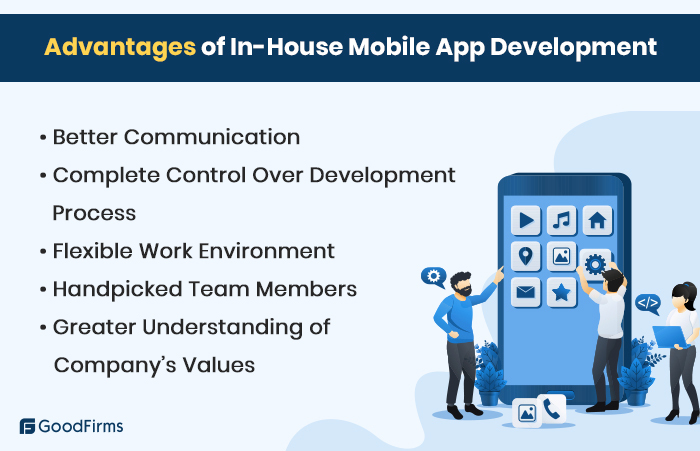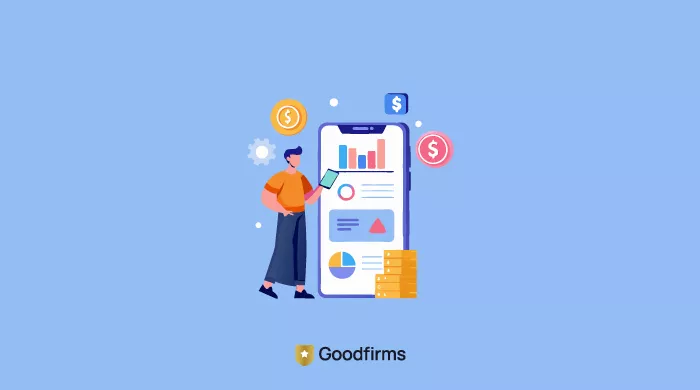Mobile apps have the unique ability to connect with many potential customers due to the growing use of the internet on smartphones and tablets. These apps help companies deliver personalized services, boost their user engagement, and are accessible for customers at any time of the day.
Here are some interesting stats regarding mobile apps:
- There will be 7 billion mobile users worldwide by 2021.
- The annual mobile app downloads reached 218 billion by 2020.
- The app store spending hit $143 billion worldwide in 2020. That's a boost of 20% year-to-year.
- The average daily time spent by people on mobile devices reached 4 hours and 10 mins. Again an increase of 20% year-to-year.
So, investing in mobile app development is worth it. Mobile apps can take your business to the next level. But, which model will you choose from to develop the app?
- Will you recruit developers, designers, project managers to develop the app?
OR
- Will you outsource the app development to another company?
Don't worry if you feel unsure which model is a suitable one. We will be sharing unbiased information on in-house and outsourcing mobile app development in detail, which will help you determine the right one for your company.
Table of Content:
1.0 In-House Mobile App Development: A Short Explanation
- 1.1 Advantages of In-House Mobile App Development
- 1.2 Disadvantages of In-House Mobile App Development
- 1.3 What is the Cost of Building an In-house App Development Team?
- 1.4 Costs For Payroll & Taxes
- 1.5 When To Develop Your App In-House
In-House Mobile App Development: A Short Explanation
The app development will occur within your company premises, which means your company will have to recruit a team of developers, designers, writers, project managers, etc., to build the mobile application. Also, you will have to provide your team with office space, proper infrastructure, and facilities. Hence, this is why we call it in-house mobile app development.
-
Better Communication
Communication is more manageable when mobile app development is in-house. It becomes easier to communicate with others since everyone is in the same space. Any issues that arise during the development process can be shared and resolved immediately. You can hold face-to-face discussions to get everyone on the same page.
-
Complete Control Over App Development Process
It will be easier to monitor the daily progress in-house. You can always go to your team and ask the developers to share the current status regarding the mobile app development. In-house app development will give you better insight and control compared to outsourcing.
-
Flexible Work Environment
If there is an urgent change you want to make in the app, then in-house enables you to contact your team immediately. Your developers can implement it on-spot. Inhouse allows better coordination among different teams as everyone is geographically available.
-
Handpicked Team Members
In-house enables you to set up your development team. So, you have the choice to recruit the best talent available in the market, the ones who share their ideas on development with you and understand the vision behind developing the app.
-
Greater Understanding of Company’s Values
In-house app developers are part of your company. So, they will be more aware of the organization's needs and core values. All concerned parties to the project will be more dedicated and communicate extensively. The team will completely understand the inner workings of the company.
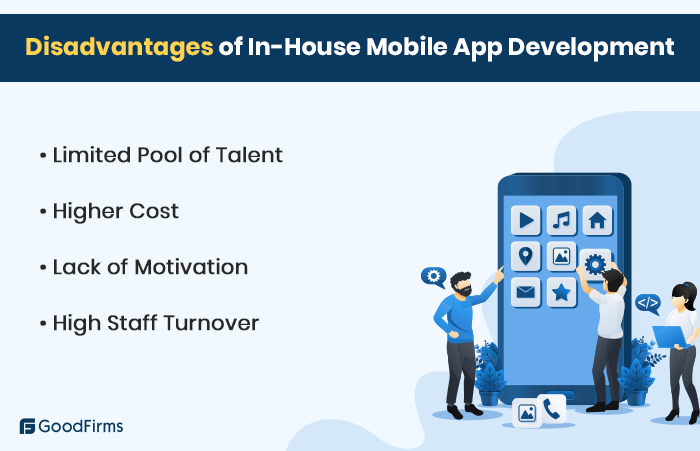
-
Limited Pool of Talent
Unlike outsourcing, here, you will have access to only a limited pool of developers and designers all the time in-house. The choices will always remain restricted compared to outsourcing, where it is limitless.
Also, you will have to provide your team with different perks to keep them motivated and dedicated to your project, which can significantly drain your company's resources.
-
Higher Cost
You will have to pay your in-house team monthly salaries and other social packages like health insurance, sick leaves, and paid time off. It's not the case with outsourcing, where you have to pay according to their working hours.
Also, your developers need high-end equipment to develop the app. It will be your responsibility to provide it to them, and these are expensive.
-
High Staff Turnover
Remember, software developers and their skills will always be in great demand. So, your team won't hesitate to leave the company for better opportunities.
Finding replacements can be time-consuming and will significantly impact your app development progress. Your project will be at a standstill until you recruit new developers as a substitute.
-
Lack of Motivation
People get comfortable quickly in-house. Due to job security, there is a lack of motivation to upskill their knowledge. It will be your responsibility to encourage them to update their skills, which will require tremendous effort because you can't force someone to learn if they don't have the desire for it.
Technology never remains the same. It's a continually changing landscape. So, your team needs to stay updated on the latest trends in the IT industry; otherwise, it will impact your company negatively. How will you serve your customers with the latest technology if your team doesn't have the required knowledge for it? That's why it will be your job to nudge them to upgrade their skills and knowledge.
What is the Cost of Building an In-house App Development Team?
Filling vacancies is a time-consuming process and costs money. Research from Deloitte says that US companies take 52 days on average to fill vacant positions. The cost to hire an individual, make job postings, conduct job interviews, provide staff training, and do background checks is $4000. It is expensive.
Indeed.com states that the average mobile app developer earns 77% more than the average worker. As of 2021, a software developer's salary is approximately $114,057. Although this is just one role in the entire team, you have to spend a minimum wage of $40,000 to hire quality talent.
So, you must be thinking about what type of team you should assemble, and how much do you have to pay them? The table below will answer that question.
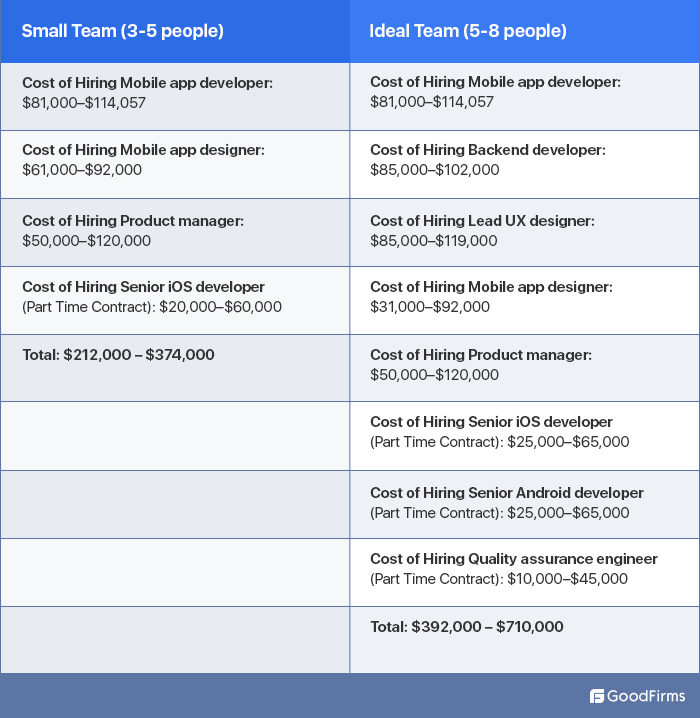
Costs For Payroll & Taxes
Every country, state, and the province has laws regarding taxes, unemployment, and healthcare. These are some additional costs that you have to keep in mind. I will share the link for you to check it out for the United States and Canada:
Goodfirms Opinion: When To Develop Your App In-House
In-house mobile app development is the right choice for a long-term project where a dedicated team can build and maintain it. If cost isn't an issue, you are okay with developers experimenting, making mistakes, and improving the process, and there’s no dearth of developers in your area. Go for it if you are not in a hurry to release the product.
Outsourcing Mobile App Development: A Short Explanation
Outsourcing mobile app development involves hiring an external team of developers to develop the apps. Here you will have the option to choose from a pool of talented developers to turn your app idea into a reality. It will be a well-established team.
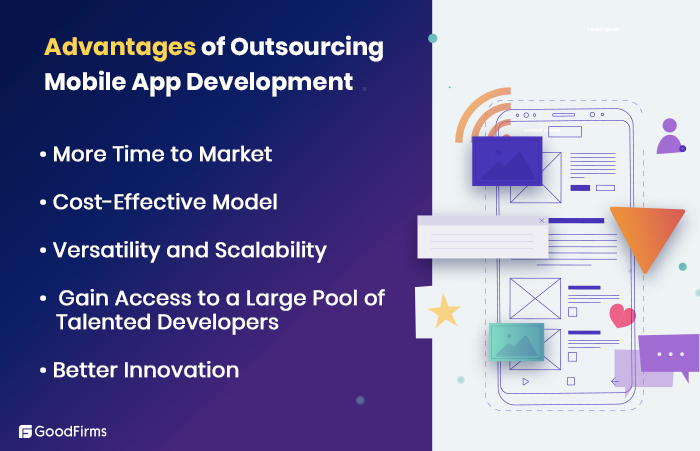
-
More Time To Market
The outsourcing agreement states that the company is liable to pay the fine if they miss the deadline for project completion. However, it only applies if there is no valid reason behind the delay. Goodfirms’ Opinion: Outsourcing companies constantly strive to deliver the work within a stipulated period. They will rarely miss the deadline. Hence, you will get your application on time, which will allow you to release it on the market quickly.
-
Cost-Effective Model
You won't have to bear overhead expenses concerning office space and equipment for developing your application. They will have everything required to build it. It will save you the cost of office rents, computers, and softwares required for mobile app development.
-
Versatility and Scalability
You will benefit from versatility if you outsource the app development to experienced developers. Also, these applications will be scalable at the same time.
Outsourcing companies that you hire will be highly proficient in mobile app development. They know the best practices. Hence your app will be scalable and versatile without spending any extra money.
-
Gain Access To Large Pool Of Talented Developers
Outsourcing gives you the freedom to recruit developers from all over the world as per your requirements. There won't be any geographical limitation in selecting the team. You have the choice to recruit the best team possible, which can deliver outstanding results in the future.
-
Better Innovation
Outsourcing companies keep themselves updated with the latest trends and technology. You won't have to worry about their skills not being updated. They continuously work towards perfecting their craft and bringing innovation in the application's development process. The freelancers acknowledge the value of staying relevant. So, you won't find any complacency in their work. Check out five tips for outsourcing mobile app development successfully for further reading.
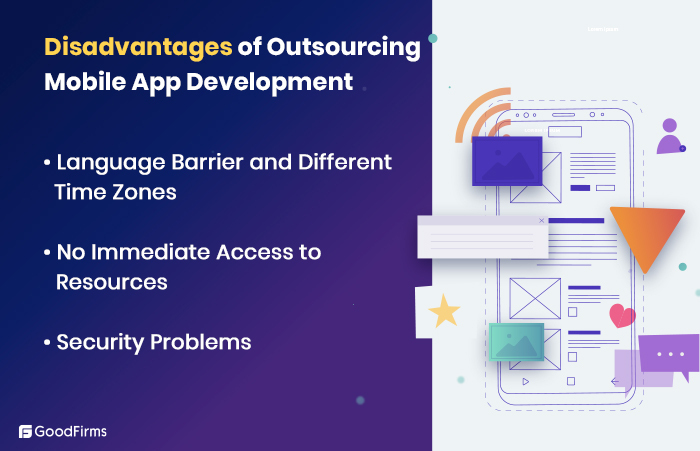
-
Language Barrier and Different Time Zones
Different time zones and language barriers can create misunderstandings when outsourcing mobile app development. So, it’s crucial to specify your expectations in advance before you assign the project to the freelancers.
-
No Immediate Access to Resources
Immediate access to resources is not possible in outsourcing. You won't be able to get in touch with your point of contact at any given point of time when you are looking for updates as everyone is not working in the same office. So, create a point of contact when working with outsourcing companies. From here, you can get regular updates regarding mobile app development.
-
Security Issues
Security is a significant concern when outsourcing mobile app development. There is a risk of your application idea getting stolen and claimed as another person's intellectual property. So, sign a non-disclosure agreement before you outsource the project. It will ensure that your ideas and information remain protected from getting stolen and misused.
The Cost of Hiring An App Development Agency
Here is the app development cost breakdown. The points mentioned below affect the price of mobile app development.
App functionality and its purpose: What the app can do for its users.
Mobile platforms and support devices: Are you developing the app for iOS and Android, and what specific device will it support?
Integration points: Are you going to integrate the app with third-party ones as the source of its content.
Use of Visual Objects: The visual objects you plan to add inside the app will significantly influence the cost and complexity.
Use of Smartphone hardware features: Adding of features like GPS navigation, NFC technology, motion coprocessor, augmented reality tech in the app.
The maintenance plan includes technical support after finishing the project and delivering it to the client.
Here are some average benchmarks for the cost of developing different types of applications.
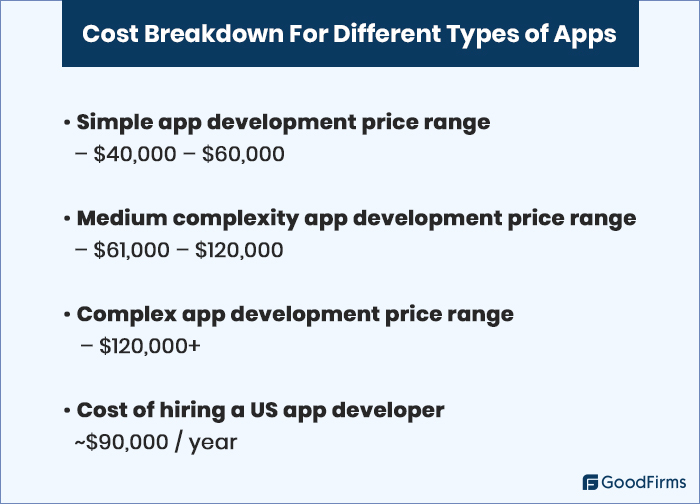
Goodfirms Opinion: When To Outsource Your App Development?
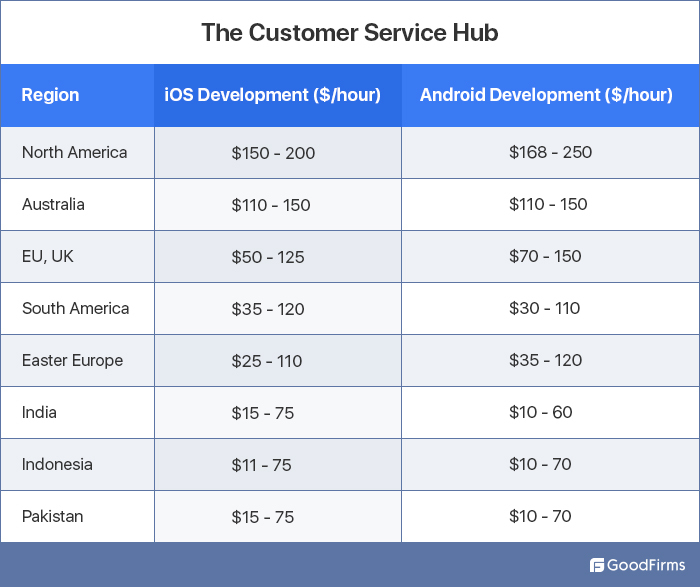
Outsourcing your application is a good idea:
- If there is a lack of development team or experience in product development.
- The company lacks experts for specific skills or expertise.
- You want to reduce development costs and market the application quickly.
The outsourcing market is witnessing exponential growth. There are tens of thousands of app development companies out there who would be more than ready to take on your project at your required time and pace. For more details on such companies, you can consult top mobile app development companies on Goodfirms. Based on customer reviews, rates, client portfolios, and more, the companies are ranked here. For further reading, check out outsourcing challenges and ways to overcome them.
FAQs
-
What Roles Can You Outsource?
- IT engineering roles: The costs of engineering services will make a massive difference in in-house vs. outsourcing.
- Customer support service: It is logical to set a team in your customers' country. They will be much better qualified to fulfill the needs and provide answers more appropriately as they reside in the same region.
- Marketing responsibilities: A professional marketing team can advertise your product effectively compared to the in-house team. An outsourced agency will incorporate many specialisms. So, they will come up with a dominant advertising and marketing campaign.
-
What is Hybrid Approach
The Hybrid model is a combination of onsite and offsite software development. This is one of the most successful models used by several companies. Almost 20-30% of the tasks are done by the onsite employees and the rest are outsourced to offshore team members.
-
Examples of Companies Working With In-House Teams?
Here are some companies that are using in-house teams:
- Amazon
- Paypal
- Salesforce
-
Examples of Companies that outsource?
Here are examples of a few companies that regularly outsource:
- Alibaba
- Basecamp
The Bottom Line
There is no suitable model as such. Ultimately, everything depends on your project requirements. However, one thing should be clear in your mind: If your app will be a lifelong project, then in-house is the way to go. Otherwise, it’s better to outsource and save on overhead costs. So, thoroughly evaluate your app idea and its details, budget and determine whether in-house or outsourcing is the right option to build the application.
